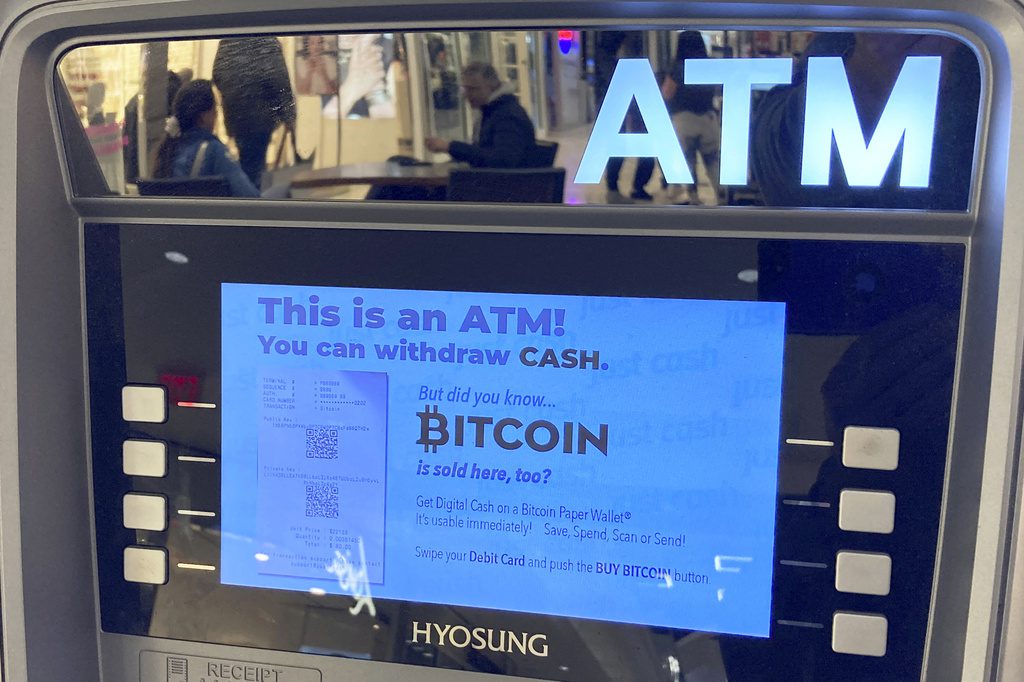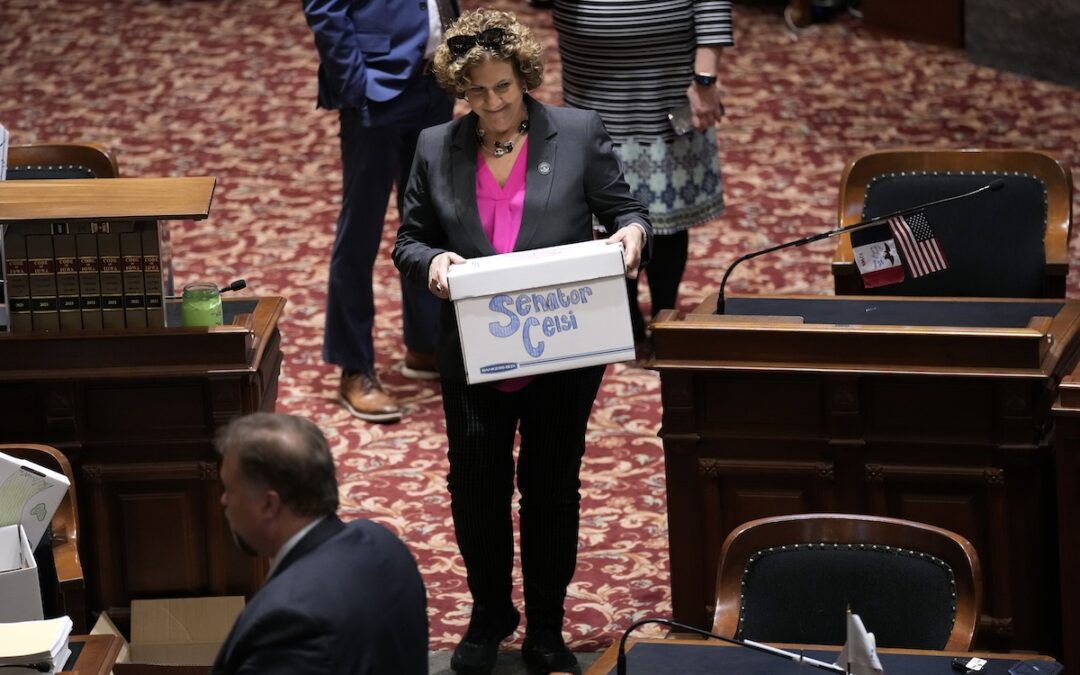
Bitcoin is for sale at an Automated Teller Machine at the Westfield Garden State Plaza shopping mall in Paramus, New Jersey, on March 13, 2023. (AP Photo/Ted Shaffrey)
A new law caps daily crypto ATM transactions at $1,000, limits fees to 15% of the transaction amount, and requires operators to provide full refunds when customers can prove they’ve been scammed. The law also mandates written warnings for customers and gives Iowa’s attorney general authority to levy hefty fines against operators who violate the rules.
Iowa Gov. Kim Reynolds signed a bill last week aiming to put limits on cryptocurrency ATMs that law enforcement says are increasingly susceptible to scams.
These ATMs are physical kiosks that facilitate the buying and selling of cryptocurrencies like Bitcoin or Ethereum, and offer an experience not unlike a traditional bank ATM. Users can initiate transactions with a debit card or even insert cash. However, they are also being used by scammers to part customers from their money.
The US Federal Trade Commission has called them a “payment portal for scammers.” Its Consumer Sentinel Network tracks data on money lost to fraudulent transactions at crypto ATMs.
In 2020, an estimated $12 million was lost to these scam transactions. By 2023, $114 million was lost to fraud—an 850% increase. Since this data requires victims to report instances of fraud, it does not reflect the full extent of financial loss at these kiosks.
In 2023, the Iowa Attorney General’s office investigated 14 crypto companies and found that $20 million had been sent through Bitcoin Depot and CoinFlip ATMs over a 3-year period.
“We already know that they target older Iowans, but now it seems that they even hunt through obituaries to target widows. They convince these older women that they need help, and then send their victims to crypto ATMs,” Attorney General Brenna Bird said in a statement earlier this year. “And the crypto ATM companies take a cut of the profits. It’s not just wrong, it’s illegal.”
The new law caps daily transactions at crypto ATMs to $1,000 and limits fees to 15% of the transaction amount. Perhaps most importantly, it requires operators to provide full refunds when customers can prove they’ve been scammed. It’s a rare example of the government stepping in to regulate an industry that has largely been charged with policing itself.
The explosive growth of Bitcoin ATMs
Crypto ATMs have spread quickly across America. The global network of kiosks has expanded by 6% in 2024 alone. The United States started 2024 with 30,411 machines and has since added 1,094 new installations, according to research by Finbold. The country also hosts more than 80% of the global Bitcoin ATMs.
In Iowa, these colorful kiosks have become a common sight in Fareway grocery stores, vape shops, and gas stations. Coin ATM Radar estimates 322 in the state of Iowa.
What makes these machines particularly attractive to scammers is their design for anonymity and speed. Unlike traditional banking, most crypto ATM transactions don’t require robust identity verification. While the kiosks come with ample disclosure warnings—including to not send money to someone you don’t know—groups like AARP are warning about the impact particularly on seniors.
“Scammers often just tell victims, ‘Go to the ATM at the convenience store’—the victim doesn’t even realize it’s a crypto machine,” said Amy Nofziger of AARP’s Fraud Watch Network.
People over 60 are more than three times as likely as younger adults to report losing money to Bitcoin ATM scams, according to FTC data. The median loss across age groups in the first half of 2024 was a staggering $10,000.

Gov. Kim Reynolds signed Republican state Sen. Charlie McClintock of Alburnett’s bill to regulate Iowa crypto ATMs. He debates the bill during a Iowa Senate subcommittee on Feb., 19, 2025.
Iowa joins states to regulate transaction size
Sen. Charlie McClintock, a Republican from Alburnett, introduced the bill after hearing a litany of instances where users were taken advantage of.
In addition to limiting the size of transactions—and therefore the financial harm a customer can reasonably suffer in a day—Crypto ATM user will also see written warnings, including one that reads: “NEVER SEND MONEY TO SOMEONE YOU DO NOT KNOW.” Operators must also provide detailed receipts.
Iowa isn’t alone in this fight. AARP reports that, since January 2024, bills have been introduced in eight state legislatures to regulate crypto kiosks. At least three states—Minnesota, California, and Vermont—already have daily transaction limits for Bitcoin ATMs.
At the federal level, Sen. Dick Durbin (D-Illinois) has introduced the Crypto ATM Fraud Prevention Act, which would limit new customers to $2,000 per day and $10,000 over their first 14 days.
“If we can’t prosecute, then we have to regulate it. [The bill] basically makes it not worth it for them,” McClintock told Iowa Starting Line before the bill passed.
Support Our Cause
Thank you for taking the time to read our work. Before you go, we hope you'll consider supporting our values-driven journalism, which has always strived to make clear what's really at stake for Iowans and our future.
Since day one, our goal here at Iowa Starting Line has always been to empower people across the state with fact-based news and information. We believe that when people are armed with knowledge about what's happening in their local, state, and federal governments—including who is working on their behalf and who is actively trying to block efforts aimed at improving the daily lives of Iowan families—they will be inspired to become civically engaged.


Renee Hardman chosen as Iowa Democrats’ nominee to replace Claire Celsi
Iowa Democrats have chosen West Des Moines City Council Member Renee Hardman as the party's nominee for a coming special election for an Iowa...

Sen. Claire Celsi remembered for her passion and outspokenness
The Democratic state senator from West Des Moines died on Oct. 6 after a bout with an undisclosed illness. West Des Moines resident Al Womble will...

Iowa Legislature passes budget bill, adjourns with no property tax cut
Lawmakers worked through the night Wednesday to reach a budget deal after a contentious session went into overtime. While most of us were sleeping,...

Opinion: Zach Nunn is my congressman. I had to travel to DC just to talk to him.
I recently traveled to Washington, D.C. with a group of Iowans to talk with my representative: Congressman Zach Nunn. We weren’t sightseeing. We...

Op-ed: Iowa School Chaplain Bill is a Christian Nationalist Knock Off
The School Chaplain bill is currently rushing through the Iowa legislature – it’s now heading to the Iowa Senate floor as H.F. 884, having passed...

Iowa House Democrats propose worker relief package amid Iowa economic headwinds
Iowa House Democrats unveiled a series of legislative proposals aimed at supporting working families as the state faces economic headwinds,...





